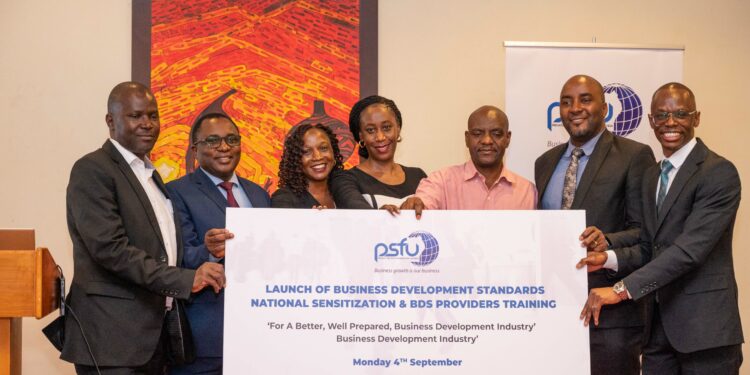The Private Sector Foundation Uganda (PSFU), in partnership with Mastercard Foundation, is implementing the “Enhancing Lead Firm Structure (LFS) for Youth Employment” project.
One of the transformative interventions in this project is addressing the challenges of poor quality of Business Development Services (BDS) and the high price demanded those services by promoting the development of new quality standards for BDS, their adoption by providers as well as training the providers to address the supply challenges, particularly for specialised areas.
To support the development of new quality standards, the African Management Institute (AMI) has been engaged to provide practical and accessible learning and development solutions to African businesses and professionals working with the technical working group, which is composed of key industry experts, Key Government officials and representatives from the entrepreneurship support organisations.
In his remarks, Francis Kisirinya, the Chief Membership Officer at PSFU said, ‘’Every stakeholder has a distinct role that is essential to achieve our common objective which is enterprise development. Our core mandate is to ensure continuous transformation of the economy through the promotion and development of sustainable and successful enterprises that are able to lead to economic growth and wealth creation.’’
He added, ‘’The BDS system is characterized by various constraints that limit its potential to generate business growth. PSFU through the infrastructure project in partnership with the Mastercard Foundation decided to contribute to the process of streamlining BDS services’’.
Johnson Abitekaniza, the Assistant Commissioner MSME, Ministry of Trade Industries and Cooperatives said, “We are here today to encourage business support service providers who are out there to start registering for the training that will come after the registration. The sensitization will help us educate and make sure that the public is very much aware of these standards and what they mean to be able to participate. We believe that through this, the service providers will be motivated to join and be trained so that they are better BDS service providers than they are now.”
He added, ‘’For enforcement when the Uganda National Bureau of Standards gazettes the standards, we are to leverage, we will work out an enforcement mechanism that will be used, although, for the start, they will be used as benchmarks that will be utilised by the BDS service providers in the ecosystem, as we will work closely with UNBS to achieve this as we target the majority of businesses in the private sector’’.
The two standards have been developed and submitted to the Uganda National Bureau of Standards (UNBS) for approval and gazette.
In efforts to implement the developed standards, the PSFU has launched a program that details the various training and engagements with the various BDS service providers and users in the country.
The campaign will also equip organisations, entrepreneurs, and business professionals with information on Uganda’s newly formulated business development support standards, tools, mentorship and resources needed to drive sustainable business growth.
In addition, through a combination of mentorship, workshops, and strategic resources, participants will have the opportunity to: Gain insights into business development standards, Acquire practical strategies to navigate business challenges and seize opportunities, and Establish meaningful connections within the business community. And access a suite of resources, including training and practical online tools.
Interested participants can log in to https://www.psfuganda.org/psfuopportunities/bds-program.html, learn more about the business development standards, and register for the training. Limited spots are available, so early registration is encouraged.
However, participants interested in this program need to be proficient in English, need to have access to the internet, and should have access to a tablet, laptop or desktop to access the online learning platform.
The programme will take two days through in-person training followed by 12 months of programme support through the African Management Institute (AMI) platform.
Meanwhile, The Private Sector Foundation Uganda (PSFU) is a representative body for the private sector in Uganda. With the aim to promote and advocate for the interests of the private sector, foster a conducive business environment, and contribute to economic growth and development in the country.
The African Management Institute (AMI) is a social enterprise that provides practical and accessible learning and development solutions to African businesses and professionals. It aims to equip individuals with the skills, knowledge, and tools they need to succeed in the workplace and contribute to economic growth and development across Africa.
Do you have a story in your community or an opinion to share with us: Email us at editorial@watchdoguganda.com













